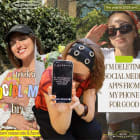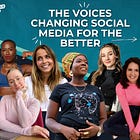Four Ways to Fix Your Feed: Dr. Kaitlyn Regehr’s guide to healthier screen time
Small changes that make your screen time healthier, happier and more intentional.
Dr Kaitlyn Regehr is an Associate Professor of digital humanities at University College London and one of the UK’s leading voices on online safety and digital literacy. She has advised government on the Online Safety Act, regularly appears across BBC and ITV, and is the bestselling author of Smartphone Nation. Her work centres on helping people understand how algorithms shape our everyday lives – and how we can take back control.
Instead of just focusing on how many hours we spend on our phones, Dr. Kaitlyn urges us to think about what we’re consuming and how it makes us feel.
Just as a balanced food diet is about quality over quantity, Dr. Kaitlyn believes our digital habits should focus less on restriction and more on nourishment. The Female Lead’s Disrupt Your Feed campaign shares this mission too: empowering people to rethink their online environments, challenge what’s being served to them, and choose content that lifts rather than drains.
In her conversation with The Female Lead, Dr. Kaitlyn shared some small, practical changes that anyone can make to take back control of their digital usage. They’re simple, powerful, and designed to slot straight into real life.
1. Do a “walkthrough” with someone you trust
Dr. Kaitlyn first tip is bold: open one of your most-used apps and scroll through it with another person watching.
She admits it can feel “super cringey” because our feeds are so personal, but that’s exactly the point. Another person can spot patterns we’ve normalised.
“If your partner says, ‘You’re getting a lot of ads for plastic surgery’, you might want to think about if that’s the best thing for you to be microdosing on all the time,” she explains
A walkthrough helps you see your feed clearly, understand what it’s feeding you, and decide what needs to change.
Related articles
2. Get intentional and “game your algorithm”
Once you’ve spotted what’s showing up, the next step is to take charge: “Decide what you want more of and what you want less of”.
That means:
Search for content you want to see
Scroll past unhelpful posts without engaging
Don’t comment out of outrage
Don’t report things unless you have to
Don’t linger on anything that drags your mood down
The less attention you give something, the faster it disappears from your feed.
Dr. Kaitlyn shares that some parents even go into their teenagers’ accounts at night to boost positive content like science videos. “Though I think we should do this all together as a family,” she laughs.
This is exactly what Disrupt Your Feed encourages: becoming an active participant, not a passive consumer.
3. Do a digital spring clean
Think of this as decluttering your online environment.
“Go on an unfollowing spree,” Dr. Kaitlyn advises. “If something doesn’t serve you, if it doesn’t empower you, if it doesn’t inform you or make you feel good, unfollow.”
She recommends doing this regularly because algorithms constantly shift. One example she gives: “If you already bought a swimsuit for holiday, you don’t need to keep seeing more swimsuits.”
Clear out your apps, clean up your home screen, remove the apps that don’t align with the kind of digital life you want, and make space for what does.
A tidy home screen can become a tiny act of resistance.
Dr. Kaitlyn suggests removing apps that pull you into endless scrolling, or keeping only tools you intentionally want quick access to. It’s a small change, but it creates friction between you and habits that don’t serve you.
This is digital nutrition at its simplest: choosing what you allow into your immediate environment.
4. Switch your phone to greyscale
Her final tip is delightfully low-tech but surprisingly effective.
“You can grayscale your phone, which means it will strip the colour out of it and just be less addictive,” she says.
Dr. Kaitlyn recommends setting your phone to switch on automatically when you connect to your home Wi-Fi. It’s a way of creating space for family, rest, and offline connection without relying on willpower alone.
“You can carve out times in your life where you ensure that the device is less addictive,” she adds.
Dr. Kaitlyn’s approach lines up perfectly with the ambition behind The Female Lead’s Disrupt Your Feed: empowering people, especially Gens Alpha and Z, to make healthier, more conscious choices online. Her tips aren’t about fear or restriction. They’re about agency.
She encourages us to think of our phones like our fridges: they can nourish us, but only if we fill them with things that support our wellbeing.
And the best part? You don’t need to overhaul your entire life. These small tweaks can start rewriting your digital habits today.
If you want to take the next step, start with the simplest question: What do you want your feed to feed you?






